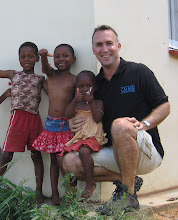I first glimpsed him one day as I was walking through one of the hospital wards -- just a flash of a young boy's smile behind a closing door as I passed, a big toothy grin that made me smile too. A week later I noticed him again, same big smile, worn by a boy of around twelve years old, who was also wearing a blue hospital gown. I greeted him as I passed by: "Unjani, bhuti?" (How are you, brother?) "I'm fine," he responded in English as he kept walking the other way. Evidently we both had places to go and people to see.
From then on I saw him often around the hospital hanging out in his hospital gown. He was always in good spirits and seemed energetic and full of life. It was clear the hospital staff -- nurses, doctors, and orderlies -- liked him too. He was clearly a favored patient. One day I asked him his name. "Siyabonga," he said, which means "we thank you." I asked him why he was in the hospital, and he simply said "I'm staying here." That sort of vague answer is not uncommon, and I assumed he must not know or understand his diagnosis and that he was a long-term patient being treated in one of the wards. Whenever I saw him I'd say hello and have a brief chat, always exactly the same: "How are you?" "I am fine." "Sharp!" (pronounced more like "shop!"). Sharp is the all-purpose word of approval used by boys and young men here, sort of like "cool" is used in the U.S.
Scott got to know Siyabonga as well, and one day he came home from the hospital and said "You know that boy Siyabonga with the big smile? He's not actually a patient at the hospital -- he's been abandoned there." It turns out that Siyabonga had come into the hospital several months before with his sick mother. Siyabonga was sick himself with some relatively mild malady, for which he received treatment and was quickly cured, but his mother had died soon thereafter of T.B. They lived a long distance from the hospital, and no other family member ever showed up to claim Siyabonga or his mother's body. After making some rudimentary efforts to locate some of his relatives, the hospital eventually buried his mother in a pauper's grave, and allowed Siyabonga to stay on at the hospital indefinitely, sleeping in a bed in the male ward. Siyabonga said he didn't want to go back home anyway; there was no one there who wanted him, and we later learned from one of the nurses that he told her he'd been beaten and abused at home. He always wore a hospital gown because the only the clothes he had were the ones he walked in with, and the hospital had no other boy's clothes of his size.
Maybe it's an indication of how much we've grown used to such sad cases that even after learning Siyabonga's story, we made no special efforts to help him. Of course, I continued to greet him and to feel happy at seeing his smile, while simultaneously feeling a little tug at my heart for his strange life as a ward of the hospital.
One day, about a month ago, Scott and I happened to be in the administrative wing together. Sitting on a bench outside the personnel director's office was Siyabonga, wearing new street clothes with a small grocery bag containing the few possessions he'd gathered since coming to the hospital. He was clearly going somewhere. "What's going on, bhuti?" we asked. "Where are you going?"
"I don't know," he shrugged. The look on his face was scared, brave, and excited all at once, and his smile quivered a bit.
"We'll find out for you," we told him as we headed into the personnel office.
The very good news was that he was being sent to Bulembu, the city of orphans I've written about previously. But I couldn't help feeling sad for this young boy when we went back out in the hall to tell him where he was going. As we explained to him what Bulembu was, and told him not to worry, that he'd be happy and well-taken care of there, I thought to myself what a strange, hurt existence this boy has already had: to leave his home with his sick mother, to watch her die in the hospital, to have no family to claim him or to return to, to live for months in a hospital ward surrounded by sick and dying people, and then to be moved again to place filled with other lost children like himself -- what sense of stability, or human relationships, or love must he have?
And yet his face is rarely without a big smile -- that brave, excited, cocky smile we've all seen on the faces of boys the world over. His smile endures without the things that bring smiles to the faces of other young boys. Scott and I walked him to the social services van that was to take him to Bulembu. As he drove off, he waved at us from the back window. His smile was bigger than ever. Siyabonga, young man.
Friday, August 28, 2009
Subscribe to:
Post Comments (Atom)

1 comment:
Your note is sad, provocative, happy, and makes me think our journey to see you two in just about six weeks.
Peace to you both for "staying the course" in your actions.
Love!
Post a Comment